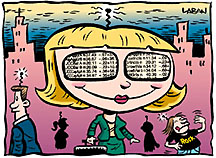|
June 12 , 2000 Poverty in America: Turning
the Tables Allied
Forces Poverty
in a Gilded Age Out
of Sight Leave
the Kids Alone The
Union Difference Down
and Out on Polk Street Other Features: Star
Wars: Episode Two "This
Is Not Life. This Is Prison" Bosnian
Serbs Still Look to Belgrade Editorial Appall-O-Meter Marching
On The
Other Side of the Street Going
to Waste Profile
Forgotten
America Ancient
Daze A
Class by Itself A
Different Point of View |


Two-Percent Solution
8.2
You'd think that the bonfire tragedy at Texas A&M last November-which
left 12 students dead after the collapse of an enormous, rickety tower
of logs-might have made school officials more receptive to the arguments
of faculty members who've been criticizing the bonfire and other Aggie
"traditions" for years. But a recent article in the Houston Chronicle
suggests that all the tragedy has done is to further close the minds of
already closed-minded administrators, who resent the so-called "two-percenters"
who don't look upon the old rituals with the appropriate uncritical enthusiasm.
One critic, biology Professor Hugh Wilson, told the paper that the window
of his office, featuring anti-bonfire posters, was recently smashed with
a brick. After the accident last November, the paper reports, university
President Ray Bowen seemed nearly as eager to investigate the critic as
it did the bonfire tragedy itself. "Dr. Wilson has spent years criticizing
the bonfire," Bowen wrote in an e-mail to a former student who had complained
about the professor. "We do monitor his activities, and he is working
within his constitutionally protected rights of communication. If he should
cross the line, we will take appropriate action."
Weekend at Bernie's
III 7.8
Life imitates art. And death imitates life. In the movie Weekend at Bernie's,
two party-hardy computer nerds are able to enjoy a weekend at a wealthy
friend's mansion-by pretending their deceased friend is still alive. An
English rugby fan recently tried a similar technique in an attempt to
get his father-in-law home after he died in his sleep following a weekend
spent at a rugby league final in Edinburgh, Scotland.
Perhaps hoping to save a little money by transporting the body home himself,
the son-in-law dressed the dead man and lugged him onto a bus. "For reasons
known only to himself, he decided to dress the man-I believe in a shirt
and tie and a suit and also a baseball cap-and he got him onto the bus,"
a Glasgow police spokeswoman told Reuters. "Apparently, he pulled the
cap down over the man's eyes and the rest of the coach were unaware that
the man was dead."
After the son-in-law called his wife to tell her that her father was dead,
she contacted the undertaker, who called the authorities. The bus was
intercepted and the body removed before it reached its final destination.
Hearing Voices 5.2
 If
Michael Saylor has his way, those robot voices in your head could soon
be more than hallucinations. Saylor, a flamboyant, would-be high-tech
visionary and founder of MicroStrategy, claims to be pioneering something
he calls "telepathic intelligence," which would enable net-connected people
with computer chips embedded in their arms and earplugs in their ears
to receive a constant stream of messages customized to fit their particular
life-not only news, weather and stock quotes but, say, the quickest route
home or a warning that their house is on fire.
If
Michael Saylor has his way, those robot voices in your head could soon
be more than hallucinations. Saylor, a flamboyant, would-be high-tech
visionary and founder of MicroStrategy, claims to be pioneering something
he calls "telepathic intelligence," which would enable net-connected people
with computer chips embedded in their arms and earplugs in their ears
to receive a constant stream of messages customized to fit their particular
life-not only news, weather and stock quotes but, say, the quickest route
home or a warning that their house is on fire.
There's no telepathy actually involved in the technology, merely a lot
of "data mining." If this sounds a tad intrusive, well, just remember-it
won't be mandatory. "If you're talking about the privacy thing," a MicroStrategy
spokesman told the Idaho Statesman, "we'd need to get the permission of
the customer."
David Futrelle is a contributing editor of In These Times.
|
In These Times ©
2000
Volume 24, Number 14 |
